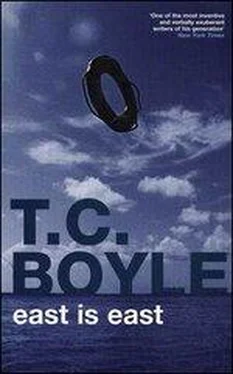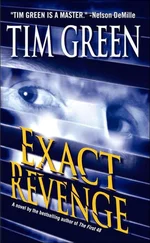Saxby was furious, enraged, frightened. No matter what he said, they didn’t believe him. He knew nothing. But until he did know, until he told them precisely where Hiro Tanaka was and why and how he’d helped him escape, he was going to sit in a jail cell and work hard at remembering. For the longest while, Saxby couldn’t even think straight—all he wanted was to spring out of the chair, snap the handcuffs like some superhero and pound that acid-washed face till it burst like a tomato. But then Abercorn waved him away in disgust and they shipped him off to the Clinch County Jail in Ciceroville and gave him his phone call. He phoned his mother. She was a towering presence, all-powerful, the mother he’d clung to as a fatherless boy trying to survive a Yankee accent in a Guale Coast school. She honed her anger in the clearest tones of reassurance and threat: “Donnager Stratton will have you out of that cell inside the hour, I guarantee you that, and we will have the governor himself in on this by nightfall—really, I still cannot believe it—and those odious petty little agents will find themselves the ones in hot water, just you believe me.”
“Mama,” he’d said to her then, “Mama, they want Ruth down here.”
“Ruthie?” she repeated, and he could almost hear the tumblers clicking in her head. “Certainly they don’t think—?”
“They think everything, Mama. They want her down here to go out in the swamp with a megaphone or something and call out his name—they say she’s the one he knows, the only one he’ll listen to—”
“But that’s absurd.”
“That’s what I told them.” He thought of Abercorn, cold ridiculous Abercorn, and what he’d said: You’d be surprised at the power of the human voice. “But they’re not asking, Mama. They want her down here tomorrow morning or they’re going to lock her up too.” He paused. He was in a big room with lazy fans and wanted posters on the walls. The deputy was watching him. “You tell her that.”
* * *
Septima told her. And she didn’t like it. Not a bit. Ruth felt suddenly that she was losing her grip on Saxby, on Septima and Thanatopsis House and the whole wide brilliant world of celebrity and accomplishment that radiated out from it, felt as if she were clinging to a ledge above a yawning gulf while Jane Shine and Detlef Abercorn and even Septima herself beat at her fingers with their microphones and the hard flat unyielding plank of the law. She had no choice in the matter. In the morning Owen was going to drive her down to the Okefenokee Swamp and she was going to go out in a boat with Detlef Abercorn and Lewis Turco and anybody else they wanted to include and she was going to cry out Hiro’s name and beg him to surrender. That was what she was going to do—for Saxby and for Septima too. And maybe even for Hiro himself.
But that was tomorrow. Tonight she was going to read.
* * *
At nine o’clock the colonists gathered in the front parlor and settled themselves into the familiar easy chairs, loveseats and sofas in the glow of the subdued and very ordinary light that emanated from the reading lamps stationed round the room. There were no spotlights and there was no microphone. Ruth appeared promptly at nine, dressed as if she were going to an outdoor barbecue. She’d spent some time on her face, her nails and her hair, but the clothes she kept simple—the T-shirt, jeans and heels she’d first envisioned. She was determined that every detail of this reading would stand in opposition to the one that preceded it. There would be no cheap thrills tonight, no Swedish accents and maudlin histrionics—just work, honest work, presented in an honest voice.
The first thing Ruth noticed as she took her seat in the big armchair beneath the chandelier was that Septima hadn’t done her hair. She was wearing the same coif she’d worn for Jane’s reading, and though she looked elegant, always looked elegant, her hairdo was a bit ragged round the edges, as if she’d slept on it. The next thing Ruth noticed was Jane. La Shine was ensconced on the damask couch between Irving and Mignonette Teitelbaum, with Seezers, in his wheelchair, perched at the far end. She’d let down her hair, the great frozen shako of last night’s pelage combed out like a rug, its Medusan tendrils involved with Irving and Teitelbaum, woven into the fabric of the couch, providing cover for the icy glittering inhuman eyes. White silk pajamas—Ruth caught a glimpse of them beneath the typhoon of hair. Jane was relaxed, all right—she looked as if she’d been dropped into the couch from a passing jet. She was watching Ruth, a perfect little smirk of contempt ironed across her lips.
Ruth tried to ignore her, tried to ignore them all—but no, that wasn’t right. She had to be warm, personable, overflowing with camaraderie and joy in their shared and collective talents. She forced herself to look round the room, smiling into each pair of eyes. And then Septima stood, put her hands together, and said, simply, “Ruth Dershowitz.”
Ruth rose to a murmur of polite applause, and then she sat down again—she wouldn’t stand, she wouldn’t dominate them, she steadfastly refused to perform. This was the lesson of the reading, this was the corrective, the return to proper form, the example that would put Jane Shine in her place once and for all.
She began with “Two Toes,” introducing the selection in a voice that was hushed, barely inflected, the voice of one-on-one conversation, easy and intimate. As she spoke she began to warm to the moment and she looked out into the faces of her fellow colonists and felt something swelling inside her, something like love. She told them the genesis of the story—perhaps in too much detail, perhaps she erred there—told them of little Jessica McClure, whom they all remembered from the news accounts of her heroic infantine battle for survival in that dark Texas well shaft, described the process by which she, Ruth, had attempted in her humble and modest way to transmute the bare facts into art. And then she began to read, investing all her strength and the strange tingle inside her that was a kind of love for them all, even Jane, in the quiet authority of the human voice—the naked, unassisted, uninflected human voice.
She began with the section that showed little Jessica grown into a recalcitrant teenager unable to reconcile her soulless Texas life with the climactic hours spent in that Freudian tunnel deep underground. There was sex in this section, plenty of it—here she’d out-Shine Shine—and a kind of fierce negativity that was sure to electrify the Thalamuses and Grobians. Then she read a longish section that took the well-shaft girl, the little heroine of the nation, and put her into a brutal marriage with a tattooed drifter fifteen years her senior. She looked up from the page when she’d finished and gave her audience the most spontaneous and heartfelt smile of her life. The only thing was, they didn’t look exactly electrified—more the opposite. Their faces were noncommittal, withdrawn, lifeless: the term “stupefied” came to her. Or no, she was misreading them—they were stunned, that was all. She held the smile and there was a flutter of applause.
“Thank you,” she whispered, grinning blissfully, and she stirred her legs luxuriously, a cat waking from a nap in the sun. She could hardly believe it—here she was, La Dershowitz, holding them all, playing the role of the true and unpretentious artist, nearly drowning in the joy of it. “Next,” she said, her voice small and modest and thankful, “I’d like to share with you a section of a work in progress called ’Sebastopol’ “—and here she paused to irradiate Irving Thalamus with her smile—“a piece Irving has been generous enough to—how shall I say it?—to coach me on, for which I’m eternally grateful. Thank you, Irving.”
Читать дальше











